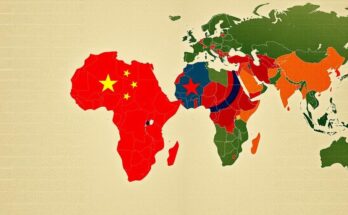Iran has nearly completed the withdrawal of its forces from Syria following the rebels’ rapid victory over the Assad regime, weakening Tehran’s regional influence. As rebel groups consolidate power, Iranian military assets have been abandoned, and the new Sunni leadership is poised to resist Iranian control, which officials argue could set back Iran’s ambitions for decades.
Iran has reportedly withdrawn nearly all of its military personnel from Syria following the insurgents’ recent triumph against the Assad regime, which represents a significant reduction in Tehran’s regional power. As the rebels seized control of Syria in merely 11 days, Iranian forces have largely departed, with many reportedly fleeing or being commanded to withdraw. The American and Arab officials have confirmed this development, highlighting abandoned military assets and vehicles along the Lebanon-Syria border as evidence of the rapid exodus.
Barbara Leaf, the senior Middle East official at the U.S. State Department, communicated that the departure of Iranian forces was markedly evident. This substantial withdrawal from Syria, Iran’s crucial ally in the region, undermines the country’s “Axis of Resistance” strategy, previously supported by its military presence and coordination with Hezbollah.
With Assad’s regime in disarray and the rebels assuming leadership, Iran finds its influence drastically diminished. The new Sunni leadership, led by groups like Hayat Tahrir al-Sham, has expressed substantial opposition to Iranian involvement and has sought to distance itself from its radical origins to gain favor in the international community.
Rebel leader Ahmed al-Sharaa articulated that the rebels’ swift takeover has effectively hindered Iran’s regional ambitions, suggesting it has set back their efforts by approximately 40 years. Amid concerns over the new leadership’s strong animosity towards Tehran, many officials surmise that the resistance against Iranian influence in Syria will be persistent. Iran itself appears to be aware of the risks posed by the adversarial government, as state media have begun depicting the new regime as extremists akin to ISIS.
Additionally, this shift in the dynamic concerning Iran’s forces occurs shortly before the inauguration of President-elect Donald Trump, who may consider actions to curtail Iranian nuclear ambitions, thereby exacerbating the regional tensions.
The article examines the withdrawal of Iranian military forces from Syria in the context of the recent victory of rebel groups over the Assad regime. This event signifies a potential shift in power dynamics in the region while dampening Iran’s influence, particularly regarding its ties to Hezbollah and its strategic interests in surrounding areas. The Iranian military presence in Syria has been a point of contention, particularly in the context of Iranian efforts to promote its ideological goals through proxies. With changes in Syria’s leadership, the article highlights the implications of the evolving power structure and the impact on Iran’s regional strategy.
In conclusion, Iran’s decisive withdrawal from Syria marks a critical juncture for the country’s influence in the region. The recent victory of rebel forces, coupled with the emerging Sunni leadership’s opposition to Iranian involvement, signifies a potential reconfiguration of alliances and power. This decline in Iranian presence not only poses challenges for Tehran’s strategic objectives but also raises questions about future relations within the Middle East, particularly with the impending administration of President-elect Trump.
Original Source: nypost.com




